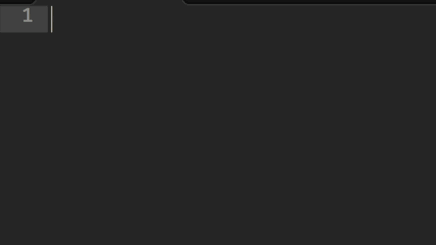hjson alternatives and similar packages
Based on the "Configuration" category.
Alternatively, view hjson alternatives based on common mentions on social networks and blogs.
-
koanf
Simple, extremely lightweight, extensible, configuration management library for Go. Support for JSON, TOML, YAML, env, command line, file, S3 etc. Alternative to viper. -
konfig
Composable, observable and performant config handling for Go for the distributed processing era -
gookit/config
📝 Go configuration manage(load,get,set,export). support JSON, YAML, TOML, Properties, INI, HCL, ENV and Flags. Multi file load, data override merge, parse ENV var. Go应用配置加载管理,支持多种格式,多文件加载,远程文件加载,支持数据合并,解析环境变量名 -
gcfg
read INI-style configuration files into Go structs; supports user-defined types and subsections -
goConfig
DISCONTINUED. goconfig uses a struct as input and populates the fields of this struct with parameters from command line, environment variables and configuration file. -
joshbetz/config
🛠 A configuration library for Go that parses environment variables, JSON files, and reloads automatically on SIGHUP. -
configuro
An opinionated configuration loading framework for Containerized and Cloud-Native applications. -
hocon
go implementation of lightbend's HOCON configuration library https://github.com/lightbend/config -
configure
Configure is a Go package that gives you easy configuration of your project through redundancy -
Genv
Genv is a library for Go (golang) that makes it easy to read and use environment variables in your projects. It also allows environment variables to be loaded from the .env file. -
swap
Instantiate/configure structs recursively, based on build environment. (YAML, TOML, JSON and env).
InfluxDB - Power Real-Time Data Analytics at Scale

Do you think we are missing an alternative of hjson or a related project?
Popular Comparisons
README
hjson-go

{
# specify rate in requests/second (because comments are helpful!)
rate: 1000
// prefer c-style comments?
/* feeling old fashioned? */
# did you notice that rate doesn't need quotes?
hey: look ma, no quotes for strings either!
# best of all
notice: []
anything: ?
# yes, commas are optional!
}
The Go implementation of Hjson is based on hjson-js. For other platforms see hjson.github.io.
Install
Make sure you have a working Go environment. See the install instructions.
- Get the sources
bash $ go get -u github.com/hjson/hjson-go - Build the hjson-cli commandline tool (optional)
bash $ cd $(go env GOPATH)/src/github.com/hjson/hjson-go/hjson-cli && go install $ hjson-cli --version# Usage as command line tool ``` usage: hjson-cli [OPTIONS] [INPUT] hjson can be used to convert JSON from/to Hjson.
hjson will read the given JSON/Hjson input file or read from stdin.
Options: -allowMinusZero Allow -0. -bracesSameLine Print braces on the same line. -c Output as JSON. -h Show this screen. -indentBy string The indent string. (default " ") -j Output as formatted JSON. -omitRootBraces Omit braces at the root. -quoteAlways Always quote string values.
Sample:
- run `hjson-cli test.json > test.hjson` to convert to Hjson
- run `hjson-cli -j test.hjson > test.json` to convert to JSON
# Usage as a GO library
```go
package main
import (
"github.com/hjson/hjson-go"
"fmt"
)
func main() {
// Now let's look at decoding Hjson data into Go
// values.
sampleText := []byte(`
{
# specify rate in requests/second
rate: 1000
array:
[
foo
bar
]
}`)
// We need to provide a variable where Hjson
// can put the decoded data.
var dat map[string]interface{}
// Decode and a check for errors.
if err := hjson.Unmarshal(sampleText, &dat); err != nil {
panic(err)
}
fmt.Println(dat)
// In order to use the values in the decoded map,
// we'll need to cast them to their appropriate type.
rate := dat["rate"].(float64)
fmt.Println(rate)
array := dat["array"].([]interface{})
str1 := array[0].(string)
fmt.Println(str1)
// To encode to Hjson with default options:
sampleMap := map[string]int{"apple": 5, "lettuce": 7}
hjson, _ := hjson.Marshal(sampleMap)
// this is short for:
// options := hjson.DefaultOptions()
// hjson, _ := hjson.MarshalWithOptions(sampleMap, options)
fmt.Println(string(hjson))
}
If you prefer, you can also unmarshal to Go objects by converting to JSON:
package main
import (
"github.com/hjson/hjson-go"
"encoding/json"
"fmt"
)
type Sample struct {
Rate int
Array []string
}
func main() {
sampleText := []byte(`
{
# specify rate in requests/second
rate: 1000
array:
[
foo
bar
]
}`)
// read Hjson
var dat map[string]interface{}
hjson.Unmarshal(sampleText, &dat)
// convert to JSON
b, _ := json.Marshal(dat)
// unmarshal
var sample Sample
json.Unmarshal(b, &sample)
fmt.Println(sample.Rate)
fmt.Println(sample.Array)
}




